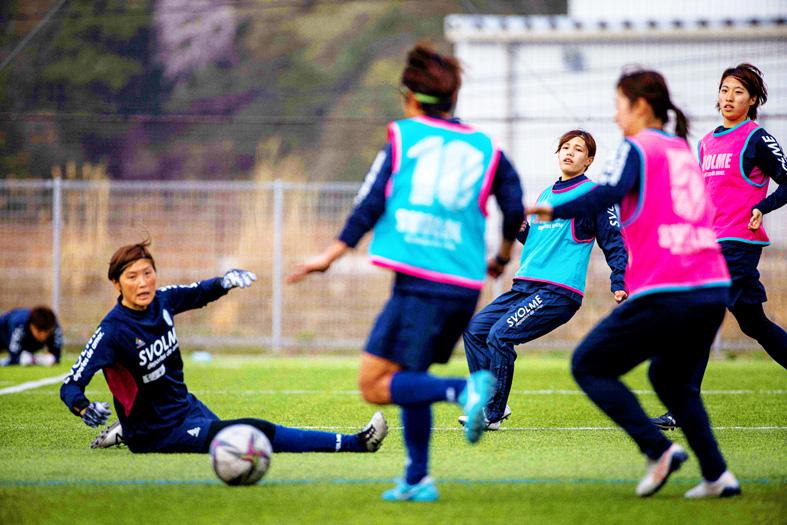Women’s football turns professional in Japan, as interest peaks
As global interest in women’s football nears its peak, the former champions of Japan envision a return to glory with the country’s premier professional league for female players.
Ten years after winning the 2011 Women’s World Cup, Japan has fallen behind, even as the sport becomes more popular and lucrative elsewhere.
Organizers of the new league hope it will bring prestige and new talent to Japanese clubs when it kicks off in September, building on the growing enthusiasm across the region ahead of the 2023 World Cup in Australia and Nova Scotia. Zealand.
Photo: AFP
“We had a sense of urgency because we thought Japan would be left behind in the world if it didn’t turn professional now,” said Kikuko Okajima, president of the WE League – short for Women Empowerment.
“We are in the midst of a pandemic, but we have decided not to delay the tournament and start the pro-league,” she said.
Japan are 10th in the FIFA Women’s Rankings, behind several European teams and America’s No.1, which was led to victory in the last World Cup by star winger Megan Rapinoe.
The national team – nicknamed Nadeshiko after a pink flower that symbolizes femininity in Japan – won silver at the London 2012 Olympics, but failed to qualify for Rio, and their medal chances this summer at home are thin.
Okajima said Japanese clubs are struggling to keep up as teams in Europe and elsewhere turn professional, which means “the level of women’s football is rising rapidly.”
Chifure AS players Elfen Saitama, one of the 11 inaugural WE League clubs, see a bright future.
Goalkeeper Natsumi Asano, 23, called the launch of the league a “very important step.”
“I have high hopes and also feel responsible as a player” for the success of the game, she said as her teammates practiced headers and discussed tactics on their training ground near. from Tokyo.
Women footballers aren’t always recognized for their talents in Japan, Asano said, recalling her surprise when she was greeted with loud cheers during an Under-17 game in the United States.
She hopes that will change as the league grows.
“If we can show that we are as good as the men’s football teams … there will be more sponsors and more supporters,” she said.
Okajima hopes to raise the profile of the sport in Japan and attract new fans, especially women in their teens and twenties.
On average, only 1,300 fans attend games in the country’s top semi-professional women’s league, while a popular team in the United States can attract 20,000 spectators, she said.
Only 3.3% of registered Japanese players are female, with the number of female players remaining roughly the same over the past 10 years.
It is still common for female players in Japan to have a day job and practice in the afternoon, when many teams do not have a permanent field.
“Women couldn’t make a living from football, but once it turns professional, becoming a footballer can be a dream and a goal for girls,” said AS midfielder Elfen Emi Yamamoto.
The 39-year-old spent several years with teams in Italy and the United States, and said many others did the same because they couldn’t turn pro in Japan.
“If the league reaches the highest level in the world, everyone, including foreign players, will want to play here,” she said.
In another boost to the players’ international ambitions, an Asian Women’s Champions League is set to launch in 2023, the regional football governing body announced earlier this year.
Meanwhile, the WE League, which is funded by sponsorship and grants, has another goal closer to home: to create more jobs for women in the male-dominated sports sector. League clubs are required to have at least one female coach, while half of the staff and one decision maker must be female.
“It’s a league that shows its social message from the start,” Okajima said.
The main challenge for the WE League could be launched amid the COVID-19 pandemic.
Preseason games had to go without spectators due to the increase in cases, but Okajima said the team was trying to mobilize support online, making a deal with an online streaming platform to broadcast their tournament.
Goalkeeper Asano is convinced that glory could once again attract the Japanese team.
“The level of the Japan team will increase if the level of the league increases,” she said.
“That way I think we will get one step closer to World Cup victory again,” she added.
Comments will be moderated. Keep comments relevant to the article. Comments containing abusive and obscene language, personal attacks of any kind or promotion will be removed and the user banned. The final decision will be at the discretion of the Taipei Times.

